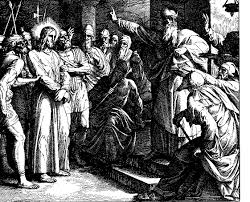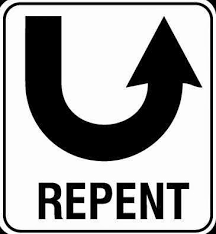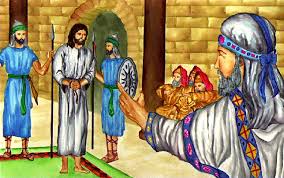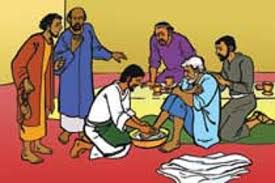Matthew 27:39-40 – And those who passed by derided him, wagging their heads and saying, "You who would destroy the temple and rebuild it in three days, save yourself! If you are the Son of God, come down from the cross."
What utter disrespect the Jews show to Jesus as he suffers on the cross! Where are the crowds who recently paved the road with palm branches and cried out 'Hosanna to the Son of David'? Where are the multitudes who were healed and set free by the power of God? Where are the thousands who ate of the loaves and fishes? They are nowhere to be found.
 What we do find is a crowd of Jews who rejoice at the downfall of Jesus. They jeer and taunt him in his darkest hour. But there is something more sinister than just torment happening here.
What we do find is a crowd of Jews who rejoice at the downfall of Jesus. They jeer and taunt him in his darkest hour. But there is something more sinister than just torment happening here.
These people are being used to shake the faith of Jesus. Our savior has been physically tortured beyond belief at this point. Every single breath he takes ravages his body with pain. His spirit is weighted down with the sin of the world. Now, at the height of his suffering, the enemy comes to viciously attack him, no doubt using every single weapon at his disposal.
Notice that the Jews taunt Jesus with the exact same words that Satan used in the wilderness temptation (Matthew 4:3, 4:6): "If you are the Son of God." Satan was tempting Jesus to bypass (or in this case end) the suffering of the cross. Can you imagine how incredibly strong that temptation must have been? And yet our Savior does not fall to the evil one. He remains strong and true; crossing the finish line of redemption on our behalf.
Matthew 27:41-42 – So also the chief priests, with the scribes and elders, mocked him, saying, "He saved others; he cannot save himself. He is the King of Israel; let him come down now from the cross, and we will believe in him."
The religious leaders are just as ignorant as the common people. Because Jesus does not immediately deliver himself from death, they incorrectly assume he does not possess the power and ability to do so. They think that it's 'now or never' for Jesus to prove that he was the Son of God; but they forgot that he had already proved it – by the miracles he had performed over the last 3 years.
They again mock him for the statement that he could destroy the temple (his body) and rebuild it (raise it again) in three days. They had no idea that the very thing they detested and derided him for was, even then, being fulfilled in front of their eyes!
What ignorant, blind leaders! Jesus never intended to 'save himself' as they understood it. He chose to be on that cross, laying down his life and later taking it back up again. He chose to suffer so he could save and deliver US from death!
Matthew 27:43 – "He trusts in God; let God deliver him now, if he desires him. For he said, "I am the Son of God."
As you recall, the real reason the Jewish leaders wanted to have Jesus put to death was because he claimed to be the Son of God. They considered his claim false, and thus they deemed him guilty of blasphemy.
Now, as he hangs there on the cross in the midst of intense pain and suffering they throw his words back in his face once again. If he really was the Son of God, as he claimed, then surely God would immediately step in and deliver him from his suffering. The fact that God did not deliver him demonstrated that he was not the Son of God (or so they thought).
Matthew 27:44 – And the robbers who were crucified with him also reviled him in the same way.
It is remarkable that even the robbers who were crucified alongside Jesus reviled him. You would think they had more important things to worry about; why waste your final breath reviling someone who is suffering with you?
But their actions prove that Jesus was forsaken and despised by all levels of society, even down to the worst of the worst.
We do note, however, that the gospel of Luke tells us one of these men repents and places his faith in Christ. Jesus assures the man that he would enter Paradise that very day (Luke 23:39-43)!
Matthew 27:45 – Now from the sixth hour there was darkness over all the land until the ninth hour.
During the last three hours that Jesus hung on the cross (noon to 3 pm), darkness covered the land. Was there a natural explanation for this?
There is speculation that it could have been an eclipse, but many scoff at this idea. They claim that history records a full moon at the time of the crucifixion, which was opposite to the sun, so an eclipse was impossible. Additionally, they say a total eclipse would not account for a three hour period of darkness.
Others believe the sun was darkened by clouds and smoke which erupted before the great earthquake that took place. This theory also has its detractors. If enough particulate matter was in the air to cause darkness, it would not fall to the earth and disappear within a mere three hours.
We may not know the exact cause of the darkness, but we do know the reason for it. God was calling attention to the death of Jesus. What a fitting witness: The birth of Christ was attended by a very great and unusual light (Matthew 2:2), while the death of Christ was attended by a very great and unusual darkness. As the Light of the World was leaving, the world was left with darkness! This was the first of several signs that were noted by those present on that day. All of these signs testify that Jesus was the Son of God, the Messiah of the world.
This darkness was predicted back in the book of Amos:
Amos 8:9 - And it shall come to pass in that day, says the Lord GOD, that I will cause the sun to go down at noon, and I will darken the earth on a clear day: And I will turn your feasts into mourning, and all your songs into lamentation; and I will bring up sackcloth upon every waist, and baldness upon every head; and I will make it like the mourning of an only son, and its end as a bitter day.
So, it would seem that God was once again reaching out to his people. The Jews had become so blinded by their hatred of Jesus that they rejected the truth. But God was going to give them several incredible signs on that day, which they would surely remember. And if they meditated on these signs (the signs were so astonishing, you could scarcely do anything else) it would again point them to Jesus as the Messiah.
Matthew 27:46 – And about the ninth hour Jesus cried out with a loud voice, saying, "Eli, Eli, lema sabachthani?" that is, "My God, my God, why have you forsaken me?"
The intense suffering of Jesus cannot be understood or explained by us; it is beyond our human comprehension. This was not just physical suffering, but spiritual suffering as well.
As we mentioned earlier, there can no doubt that Satan was present at the crucifixion. Luke 4:13 tells us that Satan departed from Jesus 'for a season', which indicates that he would return to tempt Jesus again. There can be no doubt that Satan launched upon Jesus the most severe and heinous attack possible at this time, in order to take full advantage of the weakened physical state of our Lord. Scholars suggest that the ferocity of Satan's attack was at its worst during this very moment.
Just as we do not know or understand the depth of temptation that Jesus was experiencing, neither can we know or understand the intense spiritual agony that was upon him.
If Jesus were to be a true sacrifice for us, it was necessary for him to be judged guilty at the judgment seat of God, and to suffer all the wrath of God for our sake. As he experienced that wrath, the inward sadness/brokenness of his soul was so intense and violent, that is caused him to cry out (Psalms 22:1).
We should always view the indescribable torment of Christ with utter reverence; for it was a holy sacrifice, made on our behalf.
Isaiah 53:10 – Yes it was the will of the Lord to crush him; he has put him to grief; when his soul makes an offering for guilt.
In my opinion, Isaiah has the best reflections on the suffering and agony of Christ in chapter 53 of his book (please, please take the time to read this entire chapter right now – it will be very meaningful to you, as you read the events of the crucifixion).
Matthew 27:47 – And some of the bystanders, hearing it, said, "This man is calling Elijah."
When Jesus spoke, he was not speaking Greek, but Syro-Chaldaic, which is a compilation or mixture of Hebrew and Syriac. It was not a language that everyone would have clearly understood. So, two possibilities present themselves in this situation.
One is that the Jews were mocking the cry/prayer of Jesus. If this is true, then these people clearly understood that Jesus was calling out to God, but twisted his words to make them refer to Elijah.
How is calling out to Elijah mocking Jesus? The Jews were well aware of the scripture that said Elijah must come before the Messiah would be revealed. They thought that by calling out to Elijah, Jesus was asking him to come and thereby admitting that he was not the Messiah.
Of course, if this was their thinking, we know they were wrong. John the Baptist fulfilled that role when he came in the spirit and power of Elijah, to call people to repentance (Matt 17:10-12), and bear witness that Jesus was the Messiah.
At any rate, the second possibility seems more likely. In this explanation, the people simply misunderstand what Jesus said. The language may have been unfamiliar to them. Also, keep in mind that there is now a supernatural deep darkness over the land which has a calming yet terrifying effect on the bystanders. The time of coarse joking is past; the spirit of mockery has gone. Something beyond their understanding is happening.
Matthew 27:48-49 – And one of them at once ran and took a sponge, filled it with sour wine and put it on a reed and gave it to him to drink. But the others said, "Wait, let us see whether Elijah will come to save him."
The Roman soldiers commonly drank a mixture of sour wine and water. It is entirely possible that there was a supply on hand for the soldiers to drink as they carried out the executions of the day.
So in response to the cry of Jesus, someone puts a sponge on the end of a stick, dips it in the wine/water mixture and offers it to Jesus. But while he was getting the sponge, others urged him to wait. Clearly, they all understood that supernatural things were occurring; perhaps Elijah might actually come.
Matthew 27:50 – And Jesus cried out again with a loud voice and yielded up his spirit.
John tells us the words that Jesus uttered that day:
John 19:30 – When Jesus had received the sour wine, he said, "It is finished," and he bowed his head and gave up his spirit.
How do you view the statement of Jesus? Do you see it as a cry of pain as his life expired? Or do you view it as a shout of exultation and victory?
Considering that his last words were spoken with a loud clear voice, we can surmise that he was still in full strength. His life had not been squeezed out of him by vile men, but rather he had dismissed his spirit from his body, of his own accord. When the time was right - when the temptation of Satan had been firmly rebuffed, when the sin of all the world had been fully placed into his account and he paid the price of the wrath of God, then and only then did Jesus dismiss his spirit with the loud, triumphant exclamation, 'IT IS FINISHED!'
Considering his last words were spoken with a loud, clear voice, we can surmise that Jesus attacked our spiritual enemies with vigor, strength and power. Even as he hung on the cross, he was spoiling/defeating evil principalities and powers. He was putting death in its place. Jesus did not barely win this battle; he conquered; he won by a landslide. He destroyed evil, triumphing over Satan without question. Jesus is the one who is 'mighty to save' (Isaiah 63:1). Satan's hold on us was destroyed; our redemption was sealed with the victorious cry, 'IT IS FINISHED'!
Let me offer you some encouragement:
It seems odd that our study brought us to the death of Christ in the month of December. In fact, his death on the cross is being 'posted' two days before Christmas. We might be tempted to say that our timing is off. But I don't think so.
The announcement of the birth of Jesus should never really be separated from the fulfillment of his purpose on the cross. The events are inseparable; it takes both to give us a complete picture of God's grace.
The world loves to celebrate the birth of Jesus in extravagant fashion. But they have missed the point. As wonderful as the birth of Christ was, it was really only a prelude to the main event – the crucifixion. The true cause for celebration came as Jesus proclaimed 'IT IS FINISHED' and gave up his life on the cross.
So over the course of the next few days, I encourage you to dwell not just on the promises that were made to mankind at the birth of Jesus, but to also consider the fulfillment of those promises which occurred on the cross.
By all means, rejoice and celebrate His birth! But don't shrink for examining the pain and suffering of his death, because the real victory was won through the cross, not the manger.
Let me offer you some relief:
When Jesus was born, there was rejoicing because the promised savior had come. But that promise was not actually fulfilled until Jesus died. Now that he has died and risen again, all sin – ALL SIN – can be washed white as snow. So let me give you some relief – no matter what you have done, no matter how badly you have sinned or 'blown it', forgiveness can be yours. The price has already been paid by Jesus through his suffering. So reach out to him today, and find relief from your sin.
Let me offer you some strength:
Right now, you and I still live in the realm of sin. Every day is a constant battle to overcome evil of some kind. And sometimes we can get weary in the midst of that conflict. But let me give your strength a boost – evil has been officially defeated. The day that Jesus hung on the cross and triumphantly exclaimed 'IT IS FINISHED', Satan's hold on you was broken. So take heart. Don't give up. Run your race with courage and might. Jesus has won the victory for all those who trust in him!



















 According to the gospel of John, Peter was the swordsman. The injured man's name was Malchus (John 18:10).
According to the gospel of John, Peter was the swordsman. The injured man's name was Malchus (John 18:10).




















